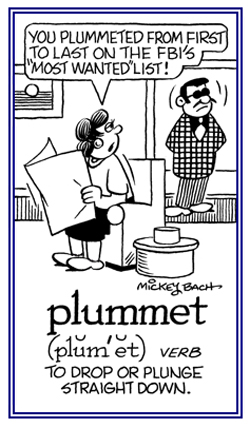plumb-, plumbo-, plumbi- +
(Latin: lead, the metal; Pb)
2. The work or trade of a plumber; or the work that a plumber does: "His business of plumbing has been going on for about ten years."
3. The act of a person who plumbs; such as, in determining depth: "His recent plumbing of the lake determined how much the water level increased since the flooding."
4. A method used to find a vertical line or to ensure that an object is set straight: "The plumbing of the outer walls showed how crooked they were."
5. The digestive, urinary, and reproductive tracts and organs of the body (slang): "There are all kinds of things that can go wrong with a person's internal plumbing."
2. A toxic condition produced by the absorption of excessive lead into the system.
3. A diseased condition, produced by the absorption of lead, common among workers in this metal or in its compounds, as among painters, typesetters, etc.
It is characterised by various symptoms; such as, lead colic, lead line, and wrist drop.
In the public supply of water this is an undesirable component because in older structures, plumbosolvent water can dissolve lead pipes with the result that there is increased levels of lead from the tap which is then consumed when people drink it.
Research has shown that lead affects multiple systems in the human body; including, the central and peripheral nervous stems.
2. A process in which some lead will be dissolved in the water that is conveyed through lead pipes.2. Relating to or consisting of lead.
2. The Latin name for lead; source of the element symbol Pb.
3. The metallic element lead.
2. Something that weighs down or oppresses; a burden.
The car swerved and was seen plummeting to the bottom of the deep canyon.
2. To decline suddenly and steeply: The weather forecaster said the temperature would plummet to a much lower temperature tomorrow.3. To experience a sudden unexpected decrease in something; such as, value or price: Henry noticed that his stock prices plummeted in value after the bad economic news was presented on TV.
4. To suddenly become pessimistic or to decline suddenly; especially, from a state of optimism to one of pessimism: Pete's expectations of getting a good job after all of the training that he did is plummeting because he has not been able to find employment for over a month.
5. Etymology: "ball of lead"; from plumb which came from Latin plumbum, "lead" via Old French plombe.

Go to this Word A Day Revisited Index
so you can see more of Mickey Bach's cartoons.
2. Desperate hazard or act; a state of being submerged or overwhelmed with difficulties.
3. A heavy and reckless betting in horse racing; hazardous speculation.
4. A large bath in which the bather can wholly immerse himself or herself.
2. The act of pitching or throwing one's self headlong or violently forward, like an unruly horse.
3. Etymology: Plunge came into English from Old French plungier (c.1140), from Vulgar (Common) Latin plumbicare, "to heave the lead", from Latin plumbum, "lead".
The original notion perhaps is of a sounding lead or a fishing net weighted with lead. Figurative use as in "to take the plunge" or "to commit oneself" is from 1845. A plunger as a mechanism is from 1777. "Plunging neckline" is traced back to 1949.
2. A mechanical device that has a plunging or thrusting motion.
3. Those who dive into water.
4. Anyone who risks losses for the possibility of bigger gains.
5. Those who gamble frequently and recklessly.
6. Machine parts; such as, pistons, that operate with thrusting or plunging movements.

